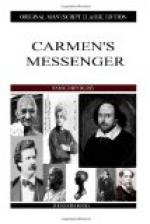Going back to his hotel, he found there was an evening train and decided to leave by it. Edinburgh had attractions, but he could come back and was anxious to get rid of the packet, moreover he grudged the time he spent away from the Garth. There were not many passengers at the station and he found an empty compartment, where he read a newspaper until he got tired and lifting a corner of the blind looked out. Here and there a light rushed back through the darkness and vanished as the express sped south with a smoothness that was a contrast to the jolting he had been used to in Canada. Indeed, except for the roar when they ran across a bridge and the confused flashing past of lamps as they swept through a station, he could hardly have imagined himself on board a train. There was, however, not much to be seen, and he took out the packet.
It looked somewhat bulkier and he examined it carefully, but the cover did not seem to have been removed. It could not have been replaced by another, because the original address was there and he knew Carmen’s hand; then there was a seal, which he did not think could have been tampered with. Besides, the man had only had it for a minute or two, and if he had opened it, would probably have taken something out instead of putting something in. Foster decided that he was mistaken about its size and returned it to his pocket.
Then he wanted a cigarette and took out the case he had got in the fur coat. Since he had left the coat in Montreal, the case was the only record of his adventure on the train, and he wondered whether he would ever be able to restore it to its owner and speculated languidly about the man. As the latter knew his name, it was strange that he had not communicated with him at the Windsor, as he had promised. He had obviously not been attacked, because there had been nothing about it in the Canadian newspapers. The thing was puzzling, but after all it did not concern Foster much and he thought about something else.
It was late when he arrived at Newcastle and went to an hotel. There was fog and rain next morning, and he saw very little of the town, which seemed filled with smoke. Taking a tram-car that carried him past rows of dingy buildings and shops where lights twinkled, he got out at the corner of a narrow street that ran back into the haze. After looking at the address on the packet, he plunged into the gloom beside a row of tall, sooty buildings. There was no pavement, and here and there a cart stood beneath an opening in the wall. The buildings were apparently warehouses, but some of the doors had brass plates and lights shone in the upper windows. By and by he found the number he wanted and entered a dirty arch, inside which a few names were painted on the wall. Graham’s was not there, but he went up the steps to inquire at the first office he reached.
The lower stories were used as a warehouse and he came to the top landing before he saw a name that seemed to be Danish or Scandinavian painted on a door. Going in, he knocked on the counter. The office was small and shabby and smelt of bacon, which he thought indicated that its occupant dealt in provisions, but he could not see much because of a glass partition. When he was getting impatient, an old man came to the counter.




